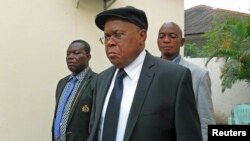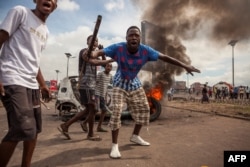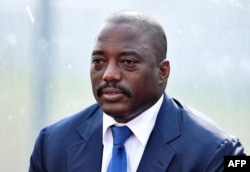The Democratic Republic of Congo's main opposition coalition, Le Rassemblement, on Tuesday announced the conclusion of a two-week conclave. Among agenda items was their response to President Joseph Kabila's intention to stay in power beyond the end of his second term and a clarification of the platform’s position on talks it has so far boycotted.
Several hundred Congolese delegates of the Rassemblement, a platform comprising most of the DRC’s opposition parties, began arriving for the ceremony held in the capital, Kinshasa, Tuesday morning. They were there to hear how leaders plan to respond to the delay of elections, which were supposed to happen in November, and President Joseph Kabila’s intention to stay in office beyond the end of his second term on December 19.
Etienne Tshisekedi, leader of Le Rassemblement, or the Assembly, is a veteran Congolese opposition politician.
Tshisekedi spoke of protests organized by the Rassemblement on September 19 in which more than 50 people died, saying it had been a warning to Kabila.
He said on October 19 the Rassemblement would gather again and give a "yellow card" to Kabila.
And on December 19, he said, the opposition would give the president a red card, continuing the soccer analogy for penalizing a player.
The Rassemblement, which has been meeting behind closed doors for several weeks, gave its final report before Tshisekedi closed the ceremony.
If Kabila stays beyond the end of his second term, the group said it would consider the president guilty of high treason.
The report also condemned ongoing talks between supporters of Kabila and a smaller opposition platform, dismissing it as a "pseudo dialogue" and "a monologue to legitimize the president’s strategy of conserving power and violating the constitution."
The Rassemblememt said it was willing to commit to talks if a number of conditions were met, including the liberation of all political prisoners, the end of politically motivated legal cases against opposition leaders, the end of intimidation and threats against opposition members, and the reopening of shuttered opposition media outlets.
The opposition groups also called for the removal of Edemo Kodjo, the current mediator of talks. Kodjo is a former Togolese prime minister who was appointed to the position by the African Union.
Freddy Matungulu, a senior figure in the Rassemblement, told VOA that he hope Kabila's alliance and the opposition groups can come to agreement for new talks.
"What do we do to avoid the country going into a legal limbo beyond the 19 December, the date when President Kabila’s second and last term in office ends. We need to go into the inclusive dialogue and this one will involve people from President Kabila’s alliance and those from the Rassemblement coming together and putting ideas together and developing a consensus so that the difficult political situation is sorted out in the best way possible for the country.
Kabila’s presidency ends on 19 December and I think the constitution is extremely clear, very unequivocal. As the president of this country you are elected for a term of five years renewable only once and this is the situation in which President Kabila is. So there is no possibility for the president to continue being head of state beyond 19 December. We want a mediator who has the right kind of moral stranding internationally within the continent here. Our preference would be someone who has been head of state before and has proven democratic credentials and I think it is possible to find such people."
Mantungulu suggested three possible mediators -- former president Abdou Diouf of Senegal, former president Jakaya Kikwete of Tanzania, and former United Nations Secretary-General Kofi Annan.
* A previous version of this story incorporated comments attributed to Congolese President Joseph Kabila - Reuters now reports that the comments came from Tanzanian President John Magufuli. VOA regrets the error.






